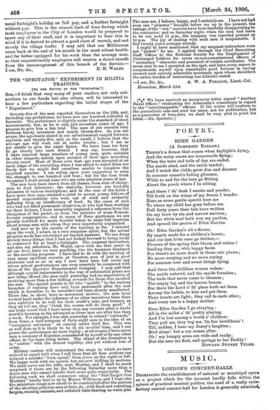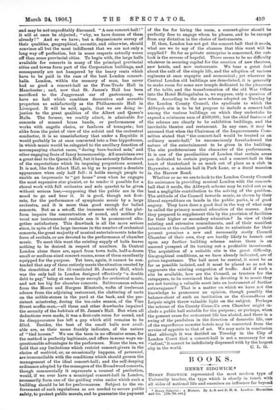MUSI C.
LONDON'S CONCERT-HALLS.
DISMISSING the establishment of national or municipal opera as a project which for the' moment hardly falls within the sphere of practical musical politics, the need of a really satis- factory central concert-hall for London is generally admitted, and may be not unprofitably discussed. " Anew concert-hall!" it will at once be objected; " why, we have dozens of them already ! " And so we have ; but a dispassionate survey of their qualities, geographical, acoustic, and otherwise, should convince all but the most indifferent that we are not only a long way off perfection, but in some respects actually worse off than some provincial cities. To begin with, the large halls available for concerts in many of the principal provincial cities and towns form part of the Corporation buildings, and consequently are not hampered by the heavy rents which have to be paid in the case of the best London concert- halls. London, within the memory of man, has never had so good a concert-hall as the Free-Trade Hall in Manchester ; and, now that St. James's Hall has been sacrificed to the Juggernaut car of gastronomy, we have no hall which combines decorative and acoustic properties so satisfactorily as the Philharmonic Hall in LiverpooL It will be said, again, that we are doing in- justice to the great qualities of the Albert and Queen's Halls. The former, we readily admit, is admirable for concerts of massed brass bands, or performances of works with angelic choirs, or fanfares of trumpets; but alike from the point of view of the soloist and the orchestral conductor, it is so unsatisfactory that under a Republic it would probably be at once converted into a free hippodrome, in which music would be relegated to the ancillary function of accompanying chariot races, " daring bare-backed acts," and other engaging feats of fancy horsemanship. All musicians owe a great deal to the Queen's Hall, but it has seriously fallen short of the expectations which its imposing proportions aroused. It is not, like the Albert Hall, so big as to present a desolate appearance when only half full : it holds enough people to enable an impresario to "get home" even when he engages the most expensive star pianist, or to render it possible for a choral work with full orchestra and solo quartet to be given without serious loss,—supposing that the public are in the mood to go and hear it. It is good, though not first- rate, for the performance of symphonic music by a large orchestra, and it is more than good enough for ballad concerto. But as a set-off, the immense width of the plat- form impairs the concentration of sound, and neither for vocal nor instrumental recitals can it be pronounced alto- gether satisfactory. This drawback is all the more serious since, in spite of the large increase in!the number of orchestral concerts, the great majority of musical entertainments take the form of recitals, or are devoted to the performance of chamber music. To meet this want the existing supply of halls leaves nothing to be desired in respect of numbers. In Central London alone there are, apart from town halls, half-a-dozen small or medium-sized concert-rooms, some of them excellently equipped for the purpose. Yet here, again, it cannot be con- tended that any of them entirely meets the situation created by the demolition of the ill-ventilated St. James's Hall, which was the only hall in London designed effectively "a double debt to pay," being at once large enough for orchestral music, and not too big for chamber concerts. Subterranean echoes from the Moore and Burgess Minstrels, wafts of irrelevant odours from the adjoining restaurant, the clattering of carts on the cobble-stones in the yard at the back, and the per- sistent minstrelsy, during the tea-cake season, of the Vine Street muffin-man,—all these and other drawbacks impaired the serenity of the habitues of St. James's Hall. But when all deductions were made, it was a first-rate room for sound, and its disappearance has left a gap which still remains to be filled. Besides, the best of the small halls now avail- able are, as their name frankly indicates, of the nature of "tied houses." We use the term in no offensive sense, for the method is perfectly legitimate, and offers in some ways un- questionable advantages to the performers. None the less, we hold that any limitations which restrict concert-givers in the choice of materiel, or, as occasionally happens, of personnel, are irreconcilable with the conditions which should govern the management of the ideal concert-hall; and the self-denying ordinance adopted by the managers of the Broadwood concerts, though commercially it represents a counsel of perfection, would, if we ever have a municipal concert-hall in London, necessarily form one of the guiding rules under which such a building should be let for performances. Subject to the en- forcement of such regulations as are needed to secure public safety, to protect public morals, and to guarantee the payment
of the fee for hiring the room, a concert-giver should be perfectly free to engage whom he pleases, and to be exempt from any dictation in the choice of instruments.
If, then, London has not got the concert-hall that it needs, what are we to say of the chances that this want will be supplied P So far as private enterprise is concerned, the out- look is the reverse of hopeful. There seems to be no difficulty whatever in securing capital for the erection of new theatres, new hotels, and new restaurants. We bear a great deal about the cult of the simple life, and the adoption of various regimens at once eupeptic and economical ; yet wherever in Central London old buildings are demolished, it is generally to make room for some new temple dedicated to the pleasures of the table, and the transformation of the old War Office into the Hotel Heliogabalus is, we suppose, only a question of time. According to the new scheme adopted on Tuesday by the London County Council, the syndicate to which the Aldwych site is to be let propose to include a concert-hall among the various buildings on which they undertake to expend a minimum sum of £500,000; but the chief features of the scheme are clearly to be exhibition buildings, and the inevitable theatre and restaurant. In any case, it may be assumed that when the Chairman of the Improvements Com- mittee stated that " the concert-hall ivould be treated as an ordinary music-hall," he unconsciously foreshadowed the nature of the entertainment to be given in the building. The site predetermines the character of the performance, It is one of the peculiarities of London that certain areas are dedicated to certain purposes, and a concert-hall in the heart of theatreland is as much out of place as a club in Bayswater, a mission hall in Park Lane, or a ducal mansion in the Harrow Road.
Whether or no we are to look to the London County Council for assistance in providing musical London with the concert- hall that it needs, the Aldwych scheme may be ruled out as at best a negligible contribution to the solving of the problem. The attitude of the Council towards music, as shown by their liberal expenditure on bands in the public parks, is of good augury. They have done a good deal in the way of what may be called the primary musical education of the masses. Are they prepared to supplement this by the provision of facilities for their higher or secondary education P In view of their existing and extensive commitments, and of their manifest intention at the earliest possible date to substitute for their present premises a new and necessarily costly Council Chamber of their own, they are hardly likely to launch out upon any further building scheme unless there is an assured prospect of its turning out a profitable investment. The acquisition of a suitable site is the great difficulty. Geographical conditions, as we have already indicated, are of prime importance. The ball must be central, it must be as far as possible isolated, and it must be placed so as not to aggravate the existing congestion of traffic. And if such a site be available, how are the Council, as trustees for the ratepayers, to be convinced that in devoting it to music they are not turning a valuable asset into an instrument of further extravagance P That is a matter on which we have not the knowledge to pronounce an opinion, though possibly the balance-sheet of such an institution as the Gewandhaus at Leipsic might throw valuable light on the subject. Perhaps the scheme of the County Council's own Chamber might in- clude a public ball suitable for the purpose ; or perhaps, when the present craze for restaurant life has abated, and there is a swing of the pendulum in the direction of domestic life, one of the superfluous monster hotels may be converted from the service of appetite to that of art. We may note in conclusion that although it was decided on Tuesday in the City of London Court that a concert-hall is not a necessary for an "infant," it cannot be indefinitely dispensed with by the largest











































 Previous page
Previous page